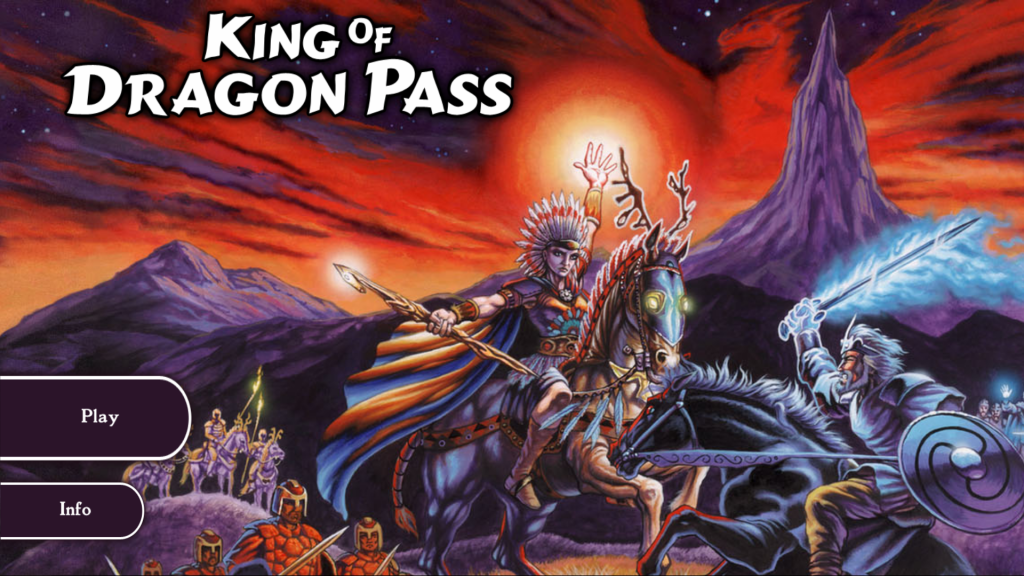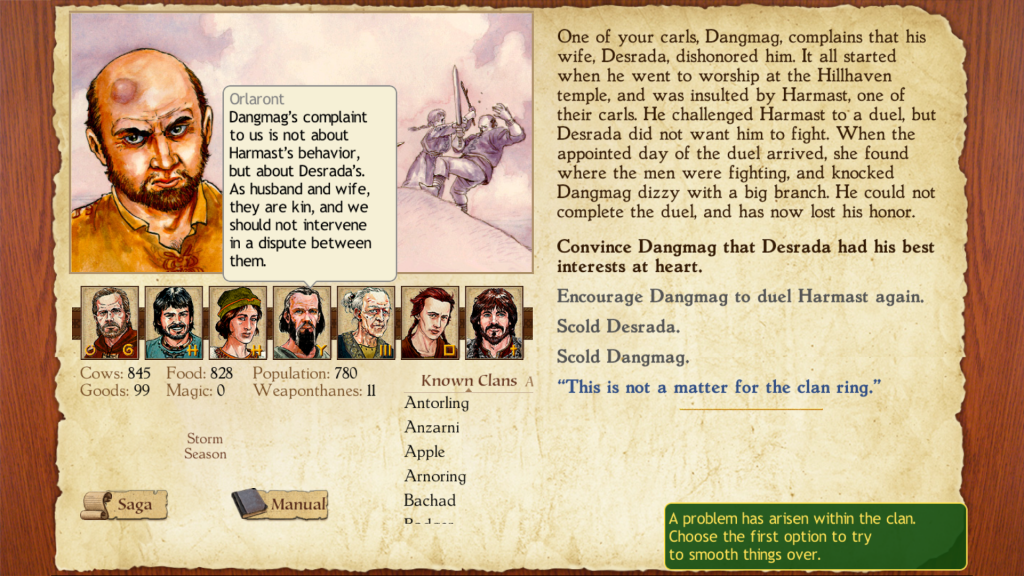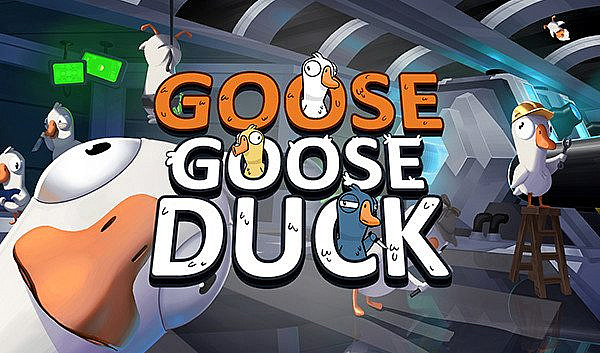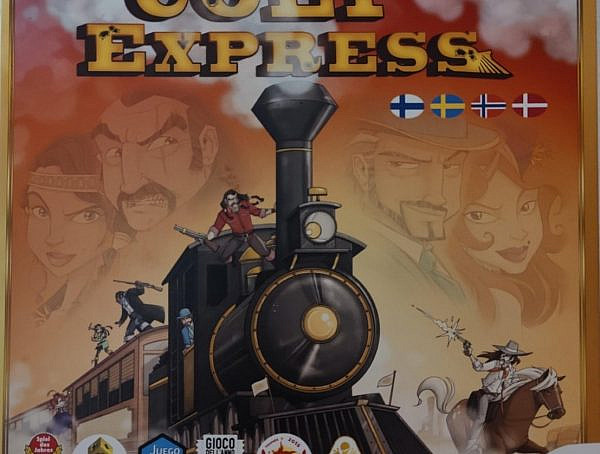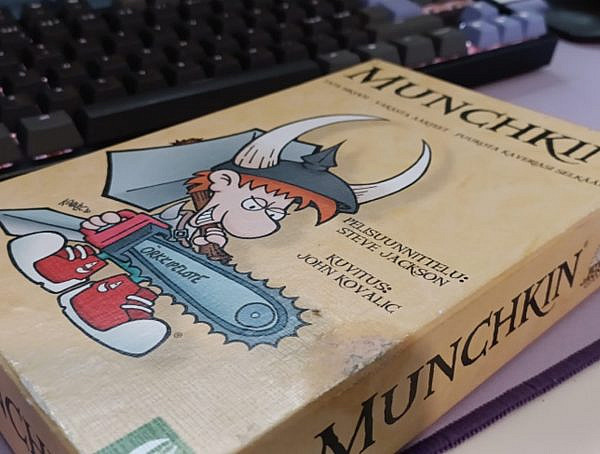Jonne Arjoranta’s paper “What does it mean to be Orlanthi? Hermeneutic Challenge in King of Dragon Pass” examines the game King of Dragon Pass and the ways the player must internalize the beliefs of the Orlanthi tribe in order to win the game.
He starts with Hans-Georg Gadamer’s philosophical hermeneutics, the theory of how we create meaning and understanding when encountering an object of art, and from this takes the concept of game hermeneutics – the theory of how games are interpreted and understood. He also introduces real-time hermeneutics, drawing attention to how King of Dragon Pass requires the player to make constant interpretations as they play the game, turn-based though it may be.
King of Dragon Pass itself is a 1999 cult classic narrative computer strategy game, based on the world of Glorantha, the setting of the 1978 role-playing game RuneQuest (and its subsequent editions and spinoffs). The world of Glorantha is very different from the traditional Tolkien-inspired high fantasy, its elves a kind of plant creature and its dwarves artificial constructs. The Orlanthi tribe itself is an amalgamation of Nordic, Celtic, and Germanic influences.
In addition to the standard strategy game fare of managing the tribe and making smart choices when picking troops in combat, the player must understand the Orlanthi way of thought. A major part of the gameplay is making value choices in narrative events. The values are those of the Orlanthi, not the player, though Arjoranta notes that there are real-world inspirations behind the Orlanthi tribe and a player’s familiarity with those will make the game easier. Learning the values of the Orlanthi and when to listen to which member of the advisory council is a core part of the game. Arjoranta notes that this kind of interpretive challenge is very rare in a video game, which usually build on kinaesthetic and strategic challenges and in fact eschew ambiguity in interpretation.
The interpretation occurs in what is called the hermeneutic circle, the process where the subject – the player in this case – holds a prejudice or preconception about the object, and forms an interpretation with new information when encountering the object anew. The process is repeated again and again as we question our previous interpretations in light of new information, forming the circle. Another key concept is the horizon of interpretation, the set of cultural assumptions and personal qualities that forms our mental landscape and therefore both enables and limits the interpretations we can make. Interpretation is always personal.
Arjoranta tracks his argument through three examples from the game, all presumably far removed from the player’s everyday life. These pertain to the legality of killing – public slaying on the battlefield is honourable, secret is not; the customary amount of cows to request in exchange for a favour – 20, it turns out; and the custom of weregild, blood money, essentially paying for damages after murdering someone. Some of the events have branching choices and finding out all the possible permutations of a series of events is only possible via several playthroughs.
The central thesis is that succeeding in King of Dragon Pass requires the player to understand what it is to be Orlanthi, with the suggestion that any foreign culture’s value system could be similarly taught. Arjoranta also holds up King of Dragon Pass as exemplary for hermeneutical challenges as a game mechanic and notes that there is no general design toolkit for this, no design language for building things open to interpretation. King of Dragon Pass is worth learning from.
Original Paper: DiGRA/FDG ’16 – Proceedings of the First International Joint Conference of DiGRA and FDG, Jonne Arjoranta http://www.digra.org/digital-library/publications/what-does-it-mean-to-be-orlanthi-hermeneutic-challenge-in-king-of-dragon-pass/ (published August 2016)
You might also like
More from Game Research Highlights
How do you want to do this? – A look into the therapeutic uses of role-playing games
Can playing RPGs contribute positively to your wellbeing? A recent study aims to find out how RPGs are being used …
Eldritch horrors and tentacles – Defining what “Lovecraftian” is in games
H.P. Lovecrafts legacy lives today in the shared world of Cthulhu Mythos and its iconic monsters. Prema Arasu defines the …
Are Souls Games the Contemporary Myths?
Dom Ford’s Approaching FromSoftware’s Souls Games as Myth reveals the Souls series as a modern mythology where gods fall, desires …







